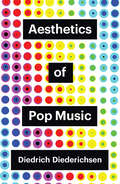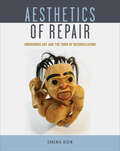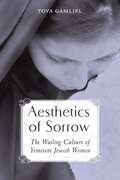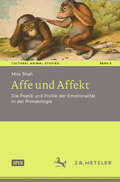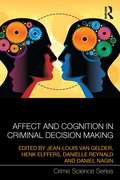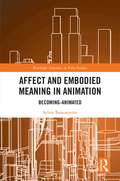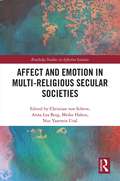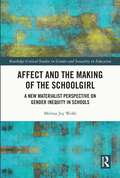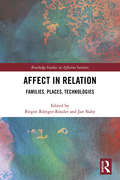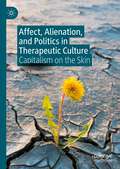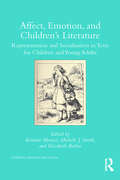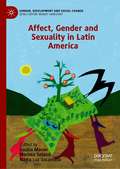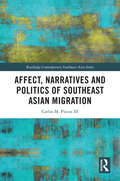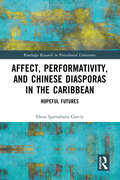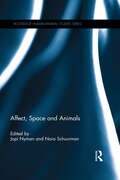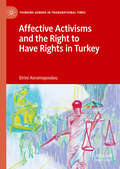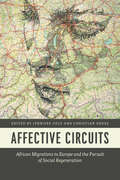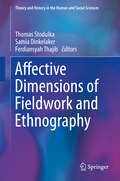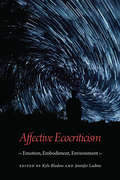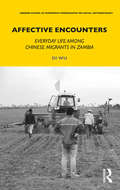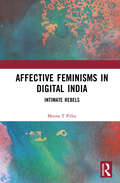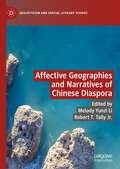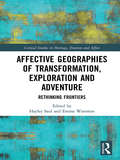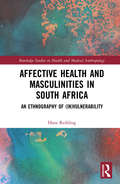- Table View
- List View
Aesthetics of Pop Music (Theory Redux)
by Diedrich DiederichsenIn this short book, the leading German cultural critic Diedrich Diederichsen puts forward a fresh and original account of pop music. He argues that pop music is not so much a form of music as a constellation of different media channels, social spaces and behavioural systems, of which music is only a part. Its own logic of attraction is based less on compositions and the expression of subjectivity and more on indexicality, real or pseudo-involuntary effects as recorded by sound technologies, and on studio discipline and staging, and hence on performance. By elaborating his innovative account of pop music as a constellation, Diederichsen develops a theory that distinguishes itself from sociology, cultural studies, media studies and ethnography, while at the same time drawing on and encompassing them all.
Aesthetics of Repair: Indigenous Art and the Form of Reconciliation
by Eugenia KisinAesthetics of Repair analyses how the belongings called “art” are mobilized by Indigenous artists and cultural activists in British Columbia, Canada. Drawing on contemporary imaginaries of repair, the book asks how diverse forms of collective reckoning with settler-colonial harm resonate with urgent conversations about aesthetics of care in art. The discussion moves across urban and remote spaces of display for Northwest Coast–style Indigenous art, including galleries and museums, pipeline protests, digital exhibitions, an Indigenous-run art school, and a totem pole repatriation site. The book focuses on the practices around art and artworks as forms of critical Indigenous philosophy, arguing that art’s efficacies in this moment draw on Indigenous protocols for enacting justice between persons, things, and territories. Featuring examples of belongings that embody these social relations – a bentwood box made to house material memories, a totem pole whose return replenishes fish stocks, and a copper broken on the steps of the federal capital – each chapter shows how art is made to matter. Ultimately, Aesthetics of Repair illuminates the collision of contemporary art with extractive economies and contested practices of “resetting” settler-Indigenous relations.
Aesthetics of Sorrow: The Wailing Culture of Yemenite Jewish Women
by Tova GamlielThe term "wailing culture" includes an array of women's behaviors and beliefs following the death of a member of their ethnic group and is typical of Jewish life in Yemeni culture. Central to the practice is wailing itself--a special artistic genre that combines speech with sobbing into moving lyrical poetry that explores the meaning of death and loss. In Aesthetics of Sorrow: The Wailing Culture of Yemenite Jewish Women, Tova Gamliel decodes the cultural and psychological meanings of this practice in an ethnography based on her anthropological research among Yemenite Jewish communities in Israel in 2001-2003. Based on participant-observervation in homes of the bereaved and on twenty-four in-depth interviews with wailing women and men, Gamliel illuminates wailing culture level by level: by the circles in which the activity takes place; the special areas of endeavor that belong to women; and the broad social, historical, and religious context that surrounds these inner circles. She discusses the main themes that define the wailing culture (including the historical origins of women's wailing generally and of Yemenite Jewish wailing in particular), the traits of wailing as an artistic genre, and the wailer as a symbolic type. She also explores the role of wailing in death rituals, as a therapeutic expertise endowed with unique affective mechanisms, as an erotic performance, as a livelihood, and as an indicator of the Jewish exile. In the end, she considers wailing at the intersection of tradition and modernity and examines the study of wailing as a genuine methodological challenge. Gamliel brings a sensitive eye to the vanishing practice of wailing, which has been largely unexamined by scholars and may be unfamiliar to many outside of the Middle East. Her interdisciplinary perspective and her focus on a uniquely female immigrant cultural practice will make this study fascinating reading for scholars of anthropology, gender, folklore, psychology, performance, philosophy, and sociology.
Affe und Affekt: Die Poetik und Politik der Emotionalität in der Primatologie (Cultural Animal Studies #6)
by Mira ShahDiese Open-Access-Publikation mit dem Titel "Affe und Affekt" untersucht anhand populärwissenschaftlicher Forschungsmemoiren die Form und Funktion von Emotionen, Affekten und Gefühlen in der Feldforschung mit Affen – und wie gerade Literatur und Film das Verhältnis von Mensch, Affe und Affekt für die Wissenschaft produktiv reflektieren und analysieren. Der Mensch ist evolutionär betrachtet ein Affe unter anderen. Doch nennt er sich selbst homo sapiens, die anderen Affen im besten Fall die ‚Menschenaffen‘ - sonst aber pans, pongos oder papios. Diese Unterscheidung ist nur ein kleines Puzzlestück in einer emotionsgetriebenen Rhetorik der Primatologie, der Wissenschaft von den Affen.
Affect and Cognition in Criminal Decision Making: Between Rational Choices And Lapses Of Self-control (Crime Science Series)
by Danielle Reynald Jean-Louis Van Gelder Henk Elffers Daniel NaginResearch and theorizing on criminal decision making has not kept pace with recent developments in other fields of human decision making. Whereas criminal decision making theory is still largely dominated by cognitive approaches such as rational choice-based models, psychologists, behavioral economists and neuroscientists have found affect (i.e., emotions, moods) and visceral factors such as sexual arousal and drug craving, to play a fundamental role in human decision processes. This book examines alternative approaches to incorporating affect into criminal decision making and testing its influence on such decisions. In so doing it generalizes extant cognitive theories of criminal decision making by incorporating affect into the decision process. In two conceptual and ten empirical chapters it is carefully argued how affect influences criminal decisions alongside rational and cognitive considerations. The empirical studies use a wide variety of methods ranging from interviews and observations to experimental approaches and questionnaires, and treat crimes as diverse as street robbery, pilfering, and sex offences. It will be of interest to criminologists, social psychologists, judgment and decision making researchers, behavioral economists and sociologists alike.
Affect and Embodied Meaning in Animation: Becoming-Animated (Routledge Advances in Film Studies)
by Sylvie BissonnetteThis book combines insights from the humanities and modern neuroscience to explore the contribution of affect and embodiment on meaning-making in case studies from animation, video games, and virtual worlds. As we interact more and more with animated characters and avatars in everyday media consumption, it has become vital to investigate the ways that animated environments influence our perception of the liberal humanist subject. This book is the first to apply recent research on the application of the embodied mind thesis to our understanding of embodied engagement with nonhumans and cyborgs in animated media, analyzing works by Émile Cohl, Hayao Miyazaki, Tim Burton, Norman McLaren, the Quay Brothers, Pixar, and many others. Drawing on the breakthroughs of modern brain science to argue that animated media broadens the viewer’s perceptual reach, this title offers a welcome contribution to the growing literature at the intersection of cognitive studies and film studies, with a perspective on animation that is new and original. ‘Affect and Embodied Meaning in Animation’ will be essential reading for researchers of Animation Studies, Film and Media Theory, Posthumanism, Video Games, and Digital Culture, and will provide a key insight into animation for both undergraduate and graduate students. Because of the increasing importance of visual effect cinema and video games, the book will also be of keen interest within Film Studies and Media Studies, as well as to general readers interested in scholarship in animated media.
Affect and Emotion in Multi-Religious Secular Societies (Routledge Studies in Affective Societies)
by Christian Von Scheve Anna Lea Berg Meike Haken Nur Yasemin UralEmotions have moved center stage in many contemporary debates over religious diversity and multicultural recognition. As in other contested fields, emotions are often one-sidedly discussed as quintessentially subjective and individual phenomena, neglecting their social and cultural constitution. Moreover, emotionality in these debates is frequently attributed to the religious subject alone, disregarding the affective anatomy of the secular. This volume addresses these shortcomings, bringing into conversation a variety of disciplinary perspectives on religious and secular affect and emotion. The volume emphasizes two analytical perspectives: on the one hand, chapters take an immanent perspective, focusing on subjective feelings and emotions in relation to the religious and the secular. On the other hand, chapters take a relational perspective, looking at the role of affect and emotion in how the religious and the secular constitute one another. These perspectives cut across the three main parts of the volume: the first one addressing historical intertwinements of religion and emotion, the second part emphasizing affects, emotions, and religiosity, and the third part looking at specific sensibilities of the secular. The thirteen chapters provide a well-balanced composition of theoretical, methodological, and empirical approaches to these areas of inquiry, discussing both historical and contemporary cases.
Affect and the Making of the Schoolgirl: A New Materialist Perspective on Gender Inequity in Schools (Routledge Critical Studies in Gender and Sexuality in Education)
by Melissa Joy WolfeBy exploring the material-discursive production of gender norms in Australian secondary schools, this book offers a novel feminist posthuman new materialist perspective on how schoolgirls are pre-determined within educational space and place. The text ultimately illustrates how gender and race inequity is reproduced through presumptive thinking and a failure to recognize student potential. Affect and the Making of the Schoolgirl maps affective accounts of students’ everyday experiences in school spaces. Student negotiations with prescriptive processes of subject participation and subject selection are explored to illustrate how inequities are systematically reproduced. Chapters also offer an examination of STEM subject fields as entitled male space. Engaging theoretically with concepts from performative feminist new materialism and affect theory, the text highlights filmic semblances created as part of an onto-epistemological project, and calls for alternative educational encounters which affirmatively acknowledge difference and promote non-binary thinking. This text will benefit postgraduate researchers, academics, and scholars with an interest in gender and sexuality education, teacher education, STEM education, gender inequality, intersectionality, and the sociology of education. Those interested in gender studies, affect theory and feminist theory, as well as educational policy and politics more broadly will also benefit from this book.
Affect in Relation: Families, Places, Technologies (Routledge Studies in Affective Societies)
by Birgitt Röttger-Rössler Jan SlabyDecades of research on affect and emotion have brought out the paramount importance of affective processes for human lives. Affect in Relation brings together perspectives from social science and cultural studies to analyze the formative, subject constituting potentials of affect and emotion. Relational affect is understood not as individual mental states, but as social-relational processes that are both formative and transformative of human subjects. This volume explores relational affect through a combination of interdisciplinary case studies within four key contexts: Part I: “Affective Families” deals with the affective dynamics in transnational families who are scattered across several regions and nations. Part II: “Affect and Place” brings together work on affective place-making in the contexts of migration and in political movements. Part III: “Affect at Work” analyzes the affective dimension of contemporary white-collar workplaces. Part IV: “Affect and Media” focuses on the role of media in the formation and mobilization of relational affect. In its transdisciplinary spirit, analytical rigor and focus on timely and salient global matters, Affect in Relation consolidates the field of affect studies and opens up new avenues for scholarly and practical co-operation. It will appeal to both students and postdoctoral researchers interested in fields such as anthropology, sociology, cultural studies, media studies and human development.
Affect, Alienation, and Politics in Therapeutic Culture: Capitalism on the Skin
by Suvi SalmenniemiThis book contributes to research on therapeutic culture by drawing on longstanding ethnographic work and by offering a new theoretical reading of therapeutic culture in today's society. It suggests that the therapeutic field serves as a key site in which a number of contradictions of capitalism are confronted and lived out. It shows that therapeutic engagements are inherently ambivalent and contradictory, as they can be articulated and engaged with in many different ways and harnessed for diverse, and often contradictory, political projects. The book takes issue with the interpretation of therapeutic culture as merely individualising, depoliticizing and working in congruence with neoliberalism, and shows that therapeutic engagements may also open up a space for contestation and critique of neoliberal capitalism, animate collective action for social change and articulate alternative forms of life and subjectivities. The book will speak to a wide variety of audiences in the social sciences and will be of particular interest to those working in the fields of sociology, anthropology, critical psychology, cultural studies, gender studies, and critical social theory.
Affect, Emotion, and Children’s Literature: Representation and Socialisation in Texts for Children and Young Adults (Children's Literature and Culture)
by Kristine Moruzi Michelle J. Smith Elizabeth BullenThis volume explores the relationship between representation, affect, and emotion in texts for children and young adults. It demonstrates how texts for young people function as tools for emotional socialisation, enculturation, and political persuasion. The collection provides an introduction to this emerging field and engages with the representation of emotions, ranging from shame, grief, and anguish to compassion and happiness, as psychological and embodied states and cultural constructs with ideological significance. It also explores the role of narrative empathy in relation to emotional socialisation and to the ethics of representation in relation to politics, social justice, and identity categories including gender, ethnicity, disability, and sexuality. Addressing a range of genres, including advice literature, novels, picture books, and film, this collection examines contemporary, historical, and canonical children’s and young adult literature to highlight the variety of approaches to emotion and affect in these texts and to consider the ways in which these approaches offer new perspectives on these texts. The individual chapters apply a variety of theoretical approaches and perspectives, including cognitive poetics, narratology, and poststructuralism, to the analysis of affect and emotion in children’s and young adult literature.
Affect, Gender and Sexuality in Latin America (Gender, Development and Social Change)
by Cecilia Macón Mariela Solana Nayla Luz VacarezzaThis book emphasizes the significance of affects, feelings and emotions in how we think about politics, gender and sexuality in Latin America. Considering the complex and even contradictory social processes that the region is experiencing today, many Latin American authors are turning to affect to find a key to understand our present situation, to revisit our history, and to imagine new possibilities for the future. This tendency has shown such a specificity and sometimes departure from northern productions that it compels us to focus more deeply on its own arguments, methods, and critical contributions. This volume features essays that explore the particularities of Latin American ways of thinking about affect and how they can shed new light into our understanding of, gender, sexuality and politics.
Affect, Narratives and Politics of Southeast Asian Migration (Routledge Contemporary Southeast Asia Series)
by Carlos M. Piocos IIIThis book explores the politics of gendered labor migration in Southeast Asia through the stories and perspectives of Indonesian and Filipina women presented in films, fiction, and performance to show how the emotionality of these texts contribute to the emergence and vitality of women’s social movements in Southeast Asia. By placing literary and filmic narratives of Filipina and Indonesian domestic workers in Hong Kong and Singapore within existing conversations concerning migration policies, the book offers an innovative approach towards examining contemporary issues of Asian migration. Furthermore, through rich ethnographic accounts, the book unpacks themes of belonging and displacement, shame and desire, victimhood and resistance, sacrifice, and grief to show that the stories of Filipina and Indonesian migrant women don't just depict their everyday lives and practices but also reveal how they mediate and make sense of the fraught politics of gendered labor diaspora and globalization. Contributing to the "affective turn" of feminist and transnational scholarship, the book draws insight from the importance and centrality of affect, emotions, and feelings in shaping discourses on women’s subjectivity, labor, and mobility. In addition, the book demonstrates the issues of vulnerability and agency inherent in debates on social exclusion, human rights, development, and nation-building in Southeast Asia. Offering an innovative and multidisciplinary approach to analyses of Asian migration, this book will be of interest to academics in the fields of Asian Studies, literary and cultural studies, film studies, gender and women’s studies, and migration studies.
Affect, Performativity, and Chinese Diasporas in the Caribbean: Hopeful Futures (Routledge Research in Postcolonial Literatures)
by Elena Igartuburu GarcíaAffect, Performativity, and Chinese Diasporas in the Caribbean: Hopeful Futures analyzes the emergence of Chinese diasporic literature and art in the Caribbean and its diasporas in the twenty-first century. This book considers the historical and critical discourse about the Chinese diasporas in the Caribbean and proposes a textual and visual archive selecting contemporary texts that signal a changing paradigm in postcolonial literature at the turn of the twenty-first century. Whereas, historically, Chinese minorities had been erased or presented as ultimate Others, contemporary texts mobilize Chinese characters and their stories strategically to propose alternative configurations of community and belonging grounded in affective structures and contest the coloniality of national imaginaries.
Affect, Space and Animals (Routledge Human-Animal Studies Series)
by Jopi Nyman Nora SchuurmanIn recent years, animals have entered the focus of the social and cultural sciences, resulting in the emergence of the new field of human-animal studies. This book investigates the relationships between humans and animals, paying particular attention to the role of affect, space, and animal subjectivity in diverse human-animal encounters. Written by a team of international scholars, contributions explore current debates concerning animal representation, performativity, and relationality in various texts and practices. Part I explores how animals are framed as affective, through four case studies that deal with climate change, human-bovine relationships, and human-horse interaction in different contemporary and historical contexts. Part II expands on the issue of relationality and locates encounters within place, mapping the different spaces where human-animal encounters take place. Part III then examines the construction of animal subjectivity and agency to emphasize the way in which animals are conscious and sentient beings capable of experiencing feelings, emotions, and intentions, and active agents whose actions have meaning for the animals themselves. This book highlights the importance of the ways in which affect enables animal agency and subjectivity to emerge in encounters between humans and animals in different contexts, leading to different configurations. It contributes not only to debates concerning the role of animals in society but also to the epistemological development of the field of human-animal studies.
Affected Labour in a Café Culture: The Atmospheres and Economics of 'Hip' Melbourne (Routledge Research in Culture, Space and Identity)
by Alexia CameronWhat does it mean to work in the ‘hip’ postmodern economy? This book develops the concept of ‘affected labour’ within Melbourne, Australia. Through the lens of café and bar culture, the book provides an ethnographic investigation into the ways that affect arises, circulates, sticks and dissipates over the course of everyday encounters. The dynamics and atmospheres of affective labour among those working in the hospitality-oriented environments are unfolded. Service work is rooted in the notion that labour is ‘performed’ by an exhausted worker for a demanding customer. This book goes beyond this idea by describing the way not only consumers are moved by the experience and seduced by the atmosphere, but more pressingly workers and employers. This book reveals the ways in which workers themselves are capitalised on by being affected pleasurably in the moment, fuelling an economy of short-term desires in which ‘affected labourers’ are manipulated.
Affective Activisms and the Right to Have Rights in Turkey (Thinking Gender in Transnational Times)
by Eirini AvramopoulouThis book presents a novel approach to the study of contemporary social movements and activism. Based on extensive ethnographic research of the life and politics of feminist, LGBTQI+, and women’s religious groups in Istanbul from 2007 to 2015, it explores the affects, meanings, and interpretations these groups express in their activism—in particular, their strategic use of human rights’ language to claim institutional and social legitimacy and their reinterpretation of gender/queer theory across politics of difference to make sense of global dynamics that affect their everyday lives. Chapters interweave personal accounts and life histories of individual activists with specific historical events to demonstrate the activists’ dissidence regarding the conditions that have defined their differently marginalised positions in Turkey and the significance of the formation of unexpected alliances. The ambivalent, yet inescapable, bargaining tool of rights is analysed as a demand over affective democratic visions, citizenship and a life worth living, and thus the right to have rights, as it is argued, pushes us to reflect on how power works when the political and affective surplus value invested in the need to rethink of rights (even beyond human rights themselves) lies both in the search for ways of institutionalising and implementing rightful demands, as well as in outlining more affective visions of political resistance. By arguing that activism is a performative and affective language that is defined by intersectional hopes, desires and dreams, as much as it engages with legal battles that define who or what might appear as being broken under specific historical and social settings, Affective Activisms employs gender and sexuality as analytical tools to make sense of local and transnational politics of resistance in the face of the re-emergence of authoritarian regimes, sexual harassment, gender violence, homo/trans phobia, and Islamophobia in Turkey and worldwide. It will be of interest to students and scholars across the fields of women's, gender and sexuality studies, queer theory, critical human rights and political theory, sociology, and social anthropology.
Affective Circuits: African Migrations to Europe and the Pursuit of Social Regeneration
by Jennifer Cole Christian GroesThe influx of African migrants into Europe in recent years has raised important issues about changing labor economies, new technologies of border control, and the effects of armed conflict. But attention to such broad questions often obscures a fundamental fact of migration: its effects on ordinary life. Affective Circuits brings together essays by an international group of well-known anthropologists to place the migrant family front and center. Moving between Africa and Europe, the book explores the many ways migrants sustain and rework family ties and intimate relationships at home and abroad. It demonstrates how their quotidian efforts--on such a mass scale--contribute to a broader process of social regeneration. The contributors point to the intersecting streams of goods, people, ideas, and money as they circulate between African migrants and their kin who remain back home. They also show the complex ways that emotions become entangled in these exchanges. Examining how these circuits operate in domains of social life ranging from child fosterage to binational marriages, from coming-of-age to healing and religious rituals, the book also registers the tremendous impact of state officials, laws, and policies on migrant experience. Together these essays paint an especially vivid portrait of new forms of kinship at a time of both intense mobility and ever-tightening borders.
Affective Dimensions of Fieldwork and Ethnography (Theory and History in the Human and Social Sciences)
by Thomas Stodulka Samia Dinkelaker Ferdiansyah ThajibThis book illustrates the role of researchers’ affects and emotions in understanding and making sense of the phenomena they study during ethnographic fieldwork. Whatever methods ethnographers apply during field research, however close they get to their informants and no matter how involved or detached they feel, fieldwork pushes them to constantly negotiate and reflect their subjectivities and positionalities in relation to the persons, communities, spaces and phenomena they study. The book highlights the idea that ethnographic fieldwork is based on the attempt of communication, mutual understanding, and perspective-taking on behalf of and together with those studied. With regard to the institutionally silenced, yet informally emphasized necessity of ethnographers’ emotional immersion into the local worlds they research (defined as “emic perspective,” “narrating through the eyes of the Other,” “seeing the world from the informants’ point of view,” etc.), this book pursues the disentanglement of affect-related disciplinary conventions by means of transparent, vivid and systematic case studies and their methodological discussion. The book provides nineteen case studies on the relationship between methodology, intersubjectivity, and emotion in qualitative and ethnographic research, and includes six section introductions to the pivotal issues of role conflict, reciprocity, intimacy and care, illness and dying, failing and attuning, and emotion regimes in fieldwork and ethnography. Affective Dimensions of Fieldwork and Ethnography is a must-have resource for post-graduate students and researchers across the disciplines of social and cultural anthropology, medical anthropology, psychological anthropology, cultural psychology, critical theory, cultural phenomenology, and cultural sociology.
Affective Ecocriticism: Emotion, Embodiment, Environment
by Kyle Bladow Jennifer LadinoScholars of ecocriticism have long tried to articulate emotional relationships to environments. Only recently, however, have they begun to draw on the complex interdisciplinary body of research known as affect theory. Affective Ecocriticism takes as its premise that ecocritical scholarship has much to gain from the rich work on affect and emotion happening within social and cultural theory, geography, psychology, philosophy, queer theory, feminist theory, narratology, and neuroscience, among others. This vibrant and important volume imagines a more affective—and consequently more effective—ecocriticism, as well as a more environmentally attuned affect studies. These interdisciplinary essays model a range of approaches to emotion and affect in considering a variety of primary texts, including short story collections, films, poetry, curricular programs, and contentious geopolitical locales such as Canada’s Tar Sands. Several chapters deal skeptically with familiar environmentalist affects like love, hope, resilience, and optimism; others consider what are often understood as negative emotions, such as anxiety, disappointment, and homesickness—all with an eye toward reinvigorating or reconsidering their utility for the environmental humanities and environmentalism. Affective Ecocriticism offers an accessible approach to this theoretical intersection that will speak to readers across multiple disciplinary and geographic locations.
Affective Encounters: Everyday Life among Chinese Migrants in Zambia (LSE Monographs on Social Anthropology)
by Di WuAgainst the background of China's rapidly growing, and sometimes highly controversial, activities in Africa, this book is among the first of its kind to systematically document Sino-African interactions at the everyday level. Based on sixteen months of ethnographic fieldwork at two contrasting sites in Lusaka, Zambia—a Chinese state-sponsored educational farm and a private Chinese family farm—Di Wu focuses on daily interactions among Chinese migrants and their Zambian hosts. Daily communicative events, e.g. banquets, market negotiations, work-place disputes, and various social encounters across a range of settings are used to trace the essential role that emotion/affect plays in forming and reproducing social relations and group identities among Chinese migrants. Wu suggests that affective encounters in everyday situations—as well as failed attempts to generate affect—should not be overlooked in order to fully appreciate Sino-African interactions. Deeply researched and with rich ethnographic detail, this book will be relevant to scholars of anthropology, international development, and others interested in Sino-African relations.
Affective Feminisms in Digital India: Intimate Rebels
by Meena T PillaiThis book studies digital feminist activism in contemporary India. It provides a close and comprehensive analysis of the postmillennial digital moment in India which has given rise to new modes of women’s digital dissent. The volume examines how anti-rape narratives, Feminichy scandals, #MeToo movements, and menstrual activisms, amongst a host of other performative feminist dissent and their discursive medialities create ‘affective digital feminisms’ which both break with and continue the residual and emergent practices within feminisms in India. It looks at digital womanspeak from India and focuses on vernacular forms of dissent, through which the author aims to decolonize feminist imaginaries from their moorings in the West. The author explores new digital, cultural, and social geographies where politically untamed women use their precarity to unsettle deep sexist structures and mount a gendered critique of the political economy of the nation state. An important contribution to the study of feminism in India, the volume will be useful for students and researchers of gender and women’s studies, cultural studies, digital sociology, intersectional feminism, transnational feminism, digital humanities, and South Asian studies. It will also be appeal to readers interested in the history of women’s dissent in India.
Affective Geographies and Narratives of Chinese Diaspora (Geocriticism and Spatial Literary Studies)
by Robert T. Tally Jr. Melody Yunzi LiIn various ways, Chinese diasporic communities seek to connect and re-connect with their “homelands” in literature, film, and visual culture. The essays in Affective Geographies and Narratives of Chinese Diaspora examine how diasporic bodies and emotions interact with space and place, as well as how theories of affect change our thinking of diaspora. Questions of borders and border-crossing, not to mention the public and private spheres, in diaspora literature and film raise further questions about mapping and spatial representation and the affective and geographical significance of the push-and-pull movement in diasporic communities. The unique experience is represented differently by different authors across texts and media. In an age of globalization, in “the Chinese Century,” the spatial representation and cultural experiences of mobility, displacement, settlement, and hybridity become all the more urgent. The essays in this volume respond to this urgency, and they help to frame the study of Chinese diaspora and culture today.
Affective Geographies of Transformation, Exploration and Adventure: Rethinking Frontiers (Critical Studies in Heritage, Emotion and Affect)
by Emma Waterton Hayley SaulCombining critical reflections from scholars around the globe as well as experiential records from some of the world’s most tenacious explorers, this book interrogates the concept of the ‘frontier’ as a realm of transformation, exploration and adventure. We discover the affective power of social, physical, spiritual and political frontiers in shaping humanity’s abilities to change and become. We collectively unpack the enduring conceptualization of the frontier as a site of nation-state identity formation, violent colonization, masculine prowess and the triumph of progress. In its place, this book charts a more complex and subtle emotional geography amidst an array of frontiers: the expanding human psyche that is induced under free-diving narcosis and tales of survival on one of the most technically difficult mountains in the world, ‘The Ogre’. Chapters consider solitude in the Sahara, near-death experiences in Tibetan Buddhism, the aftermath of a volcanic eruption in Bali, the Spanish Imaginary, snatched moments of sexual curiosity, and many more. This book will be of upmost importance to researchers working on theories of affect, the Anthropocene, frontier theory and human geography. It will be vital supplementary reading for undergraduates and postgraduates on courses such as Heritage Studies, Human and Cultural Geography, Anthropology, Tourism Studies and History.
Affective Health and Masculinities in South Africa: An Ethnography of (In)vulnerability (Routledge Studies in Health and Medical Anthropology)
by Hans ReihlingAffective Health and Masculinities in South Africa explores how different masculinities modulate substance use, interpersonal violence, suicidality, and AIDS as well as recovery cross-culturally. With a focus on three male protagonists living in very distinct urban areas of Cape Town, this comparative ethnography shows that men’s struggles to become invulnerable increase vulnerability. Through an analysis of masculinities as social assemblages, the study shows how affective health problems are tied to modern individualism rather than African ‘tradition’ that has become a cliché in Eurocentric gender studies. Affective health is conceptualized as a balancing act between autonomy and connectivity that after colonialism and apartheid has become compromised through the imperative of self-reliance. This book provides a rare perspective on young men’s vulnerability in everyday life that may affect the reader and spark discussion about how masculinities in relationships shape physical and psychological health. Moreover, it shows how men change in the face of distress in ways that may look different than global health and gender-transformative approaches envision. Thick descriptions of actual events over the life course make the study accessible to both graduate and undergraduate students in the social sciences. Contributing to current debates on mental health and masculinity, this volume will be of interest to scholars from various disciplines including anthropology, gender studies, African studies, psychology, and global health.
